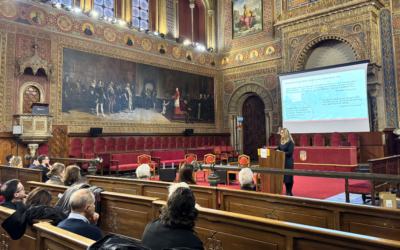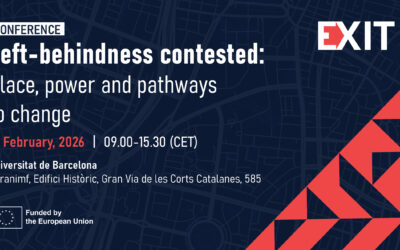The EXIT project, funded by the European Union’s Horizon Europe programme, explores sustainable strategies for tackling territorial inequalities using an intersectional approach. It uses mixed research methods to comprehensively analyse the concept of ‘being left behind’, which is used to describe territorial inequalities in specific areas. The project aims to identify strategies and practices for tackling these inequalities and to better understand why these areas are perceived as ‘left behind’.
One of the factors that can exacerbate territorial inequalities is undoubtedly a lack of mobility. Lack of mobility tends to increase social and territorial inequalities. For the exercise of fundamental rights, individual mobility is essential. In the Belgian region of Wallonia, mobility problems prevent many people from accessing healthcare, education, social support, administrative formalities, cultural activities or employment. In the absence of an adequate public transport system serving their geographical area, some people are not able to carry out all of these steps because they do not have a vehicle of their own or do not have the income to buy one (CAIPS, 2024).
To overcome these difficulties, the concept of “inclusive mobility”, understood as a transport system that enables all citizens to travel smoothly and autonomously, offers sustainable mobility solutions, particularly for the most vulnerable citizens, young people living in rural areas or in disadvantaged districts, the elderly or people with disabilities (Mob’In Europe, 2021). Inclusive mobility aims to support the development of skills that are essential for independent travel, such as access to information, reading a timetable, understanding pictograms and using online digital tools (HERNJA-MERGIER, 2020). Inclusive mobility also promotes the development of infrastructures and services that allow people to travel in good conditions, whether in terms of pricing, access for PRMs, safety, specific equipment for children, parking, control systems, etc. (IWEPS, 2024).
In this context, several initiatives are being developed to defend inclusive mobility in Wallonia, such as the “Inclusive Mobility” working group within the framework of the ESCAP project[1]. This group is listing all mobility practices in Wallonia to examine them through the prism of their inclusiveness. The “Mobility for All” consortium, led by the CAIPS association[2], aims to set up training courses for drivers that are accessible both pedagogically and financially to under-qualified jobseekers. It also aims to develop their multimodal mobility.
For more information on the EXIT project, please visit exit-project.eu.
References:
- AUXILIA, « Mobilité, insertion et accès à l’emploi : constats et perspectives », Paris, 2013
- CAIPS, Mémorandum Mobilité Inclusive 2024
- HERNJA G., MERGIER A., « La mobilité des jeunes dans un territoire rural », Laboratoire de la Mobilité inclusive, janvier 2020
- IWEPS, Vers une mobilité active et Inclusive, 2024
- Mob’In Europ, M[OB]ILITANCES, Mobilités inclusives en Europe Recommandations, glossaire et illustrations, 2021
- Projet ESCAP
- STRÄULI Louise, Public Transport as Contested Public Space: Fare Policies and Daily Mobilities in Brussels and Tallinn, Thesis submitted in fulfilment of the requirements of the PhD Degree in Sciences (ULB – “Doctorat en Sciences”) and a doctoral degree in Philosophy (TLÜ – “Studies of Cultures”), 30.04.2024
[1] A collective project that brings together academic and field experts, coordinating working groups each year to support the development of social economy enterprises and provide answers to their day-to-day challenges through the co-construction of knowledge and practical tools.
[2] A network of non-profit organisations active in the fields of mobility, socio-professional integration and social action.



